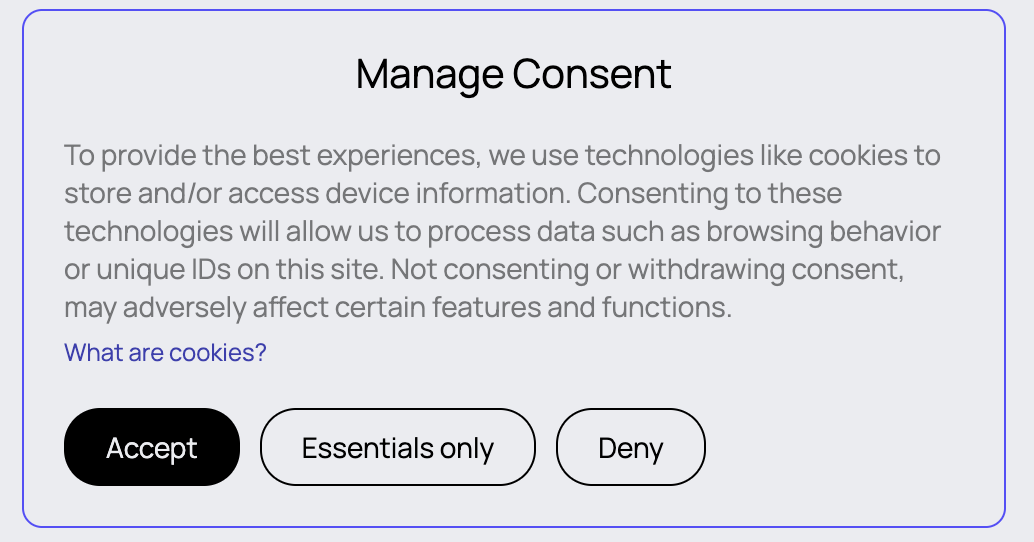What Are Cookies?
Marketing
March 7, 2025
Written by: Kurt C.

You’ve probably seen a banner pop up when visiting a website saying something like “We use cookies to improve your experience.” But what exactly are cookies — and should you be worried?

Let’s break it down in simple terms.
What Are Cookies?
Cookies are small text files that websites store on your device through your web browser. They contain bits of information that help the website remember certain things about your visit — such as your preferences, settings, or items you’ve added to a shopping cart.
There are different types of cookies:
- Session Cookies: These are temporary and disappear once you close your browser.
- Persistent Cookies: These remain on your device until they expire or are manually deleted.
- First-Party Cookies: Set by the website you're visiting.
- Third-Party Cookies: Set by external services like advertisers or analytics providers.
Why Do Websites Use Cookies?
Cookies are used for a variety of reasons, depending on the type of website and what features it offers. Here are the most common reasons:
1. Essential Functionality
Some cookies are necessary for the website to work properly:
- Remembering items in your cart
- Keeping you logged in
- Saving your language or region preferences
These are called strictly necessary cookies — without them, some features may break.
2. Analytics & Performance
These cookies track how you use a website:
- Which pages you visit
- How long you stay
- What buttons you click
Tools like Google Analytics use these cookies to help website owners understand how to improve the experience.
3. Marketing & Personalization
These cookies help deliver targeted ads and personalize your experience:
- Showing ads based on past behavior
- Recommending content you’re more likely to enjoy
- Tracking you across websites
These are often called third-party cookies and are the ones most regulated by privacy laws.
Cookies and Privacy
Because cookies can store personal or behavioral data, they’re regulated under laws like:
- GDPR (EU)
- ePrivacy Directive
- CCPA (California)
That’s why websites now ask for your consent before using non-essential cookies. You get to choose whether to accept, reject, or customize your preferences.
What Happens If You Block Cookies?
Blocking cookies — especially all cookies — can significantly change how you experience the web. In practical terms, here’s what may happen if you disable or block cookies in your browser:
- You may be logged out more often. Websites won't remember your login session once you close the tab or browser.
- Your preferences won't be saved. Things like selected language, theme, or cookie settings themselves may reset every time you visit.
- Shopping carts may not work as expected. If you're browsing an online store, adding items to your cart may not persist as you navigate between pages.
- Interactive tools and features might be limited. Features like live chat, forms that auto-fill your info, or personalized content may not load properly.
That said, some users choose to block or limit cookies for increased control and privacy, especially when it comes to third-party or advertising cookies, which are used to serve targeted ads or measure user behavior across multiple sites.
Should You Block Cookies?
It depends on your priorities:
- If convenience and full functionality matter most, allowing at least essential and functional cookies is usually the best option. These help the site remember who you are and work the way it was intended.
- If you're more concerned about privacy, you might consider blocking third-party or marketing cookies while keeping essential ones enabled. Most browsers and websites (including ours) now allow fine-tuned control over this.
Ultimately, it’s about finding a balance that works for you — and knowing that you’re in control. Most modern websites (ours included) provide a cookie consent manager where you can easily adjust your settings at any time.
How to View Cookies Stored by a Website
If you’re curious about what kind of cookies a website is storing in your browser, most modern browsers make it easy to inspect this data. Here's how to do it in Google Chrome (or Chromium-based browsers like Edge or Brave):
Steps to View Cookies:
- Open the website you want to inspect.
- Press
F12or Right-click > Inspect to open Developer Tools. - In the top bar of the panel, click the “Application” tab.
- On the left-hand menu, under “Storage”, click “Cookies”.
- You’ll see a list of domains — click the one that matches the website you're on.
From there, you’ll be able to see:
- The name of each cookie
- Its value
- Expiration date
- Whether it’s secure or HTTP-only
Example: Our Site’s Theme Preference Cookie
On s11.mt, we use a simple cookie to remember your theme preference — whether you selected light mode or dark mode. This cookie ensures that your chosen appearance is applied the next time you visit the site, giving you a consistent experience.
What This Means:
Most cookies will have short, functional names and values that help the website operate smoothly — things like remembering your login status or preferences. You might also see cookies related to analytics tools or performance optimization. This can be a great way to better understand how a website interacts with your browser — and what data it stores (or doesn’t store).
Final Thoughts
Cookies help make the internet more functional and personalized, but they also raise important privacy concerns. The good news is: you’re in control. And as website owners, it’s our responsibility to handle cookies transparently and respectfully.






